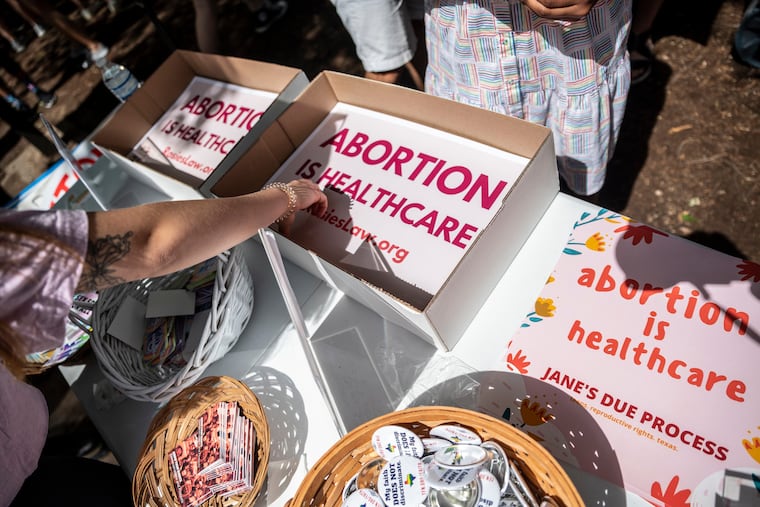Texas just enacted a law that promotes reproductive coercion. Pa. has to act now. | Opinion
Our state has already seen several anti-abortion bills introduced this year, with the promise of more on the way.

The passage of an abortion ban after six weeks of pregnancy in Texas is the latest in a series of severe restrictions in the state. The playbook includes laws that force providers to share false information about abortion with their patients, harsh constraints on public funding of abortion, and unnecessary regulations on abortion providers that have forced many clinics to shut down.
The Texas developments are alarming, with the Supreme Court voting 5-4 late Wednesday night to deny an emergency appeal from abortion providers and others to block the new restrictions. But they should come as no surprise — these happen in other states, too, and should light a fire for Pennsylvanians concerned about health-care justice.
» READ MORE: The Supreme Court’s decision on a Texas abortion ban raises the stakes for the Pa. governor’s race
Our state’s General Assembly has given millions of dollars to Real Alternatives, which funds anti-abortion centers (AACs), sometimes referred to as crisis pregnancy centers or fake clinics. Since its inception, RA has received over $100 million from the state, most of which comes from taxpayers. AACs have grown in number since COVID-19, outnumbering abortion clinics three to one. They prey on Black and brown pregnant people living in poverty by promising them free supplies like diapers and formula, only to lie and manipulate them from having an abortion. At Women’s Medical Fund — which has fought for 36 years to ensure and expand access to abortion care for anyone who needs it, regardless of zip code, income, or reason — we heard of an instance where a woman visited a Philadelphia AAC and was told she had miscarried, only to find out weeks later she was still pregnant.
Not only does Pennsylvania generously fund Real Alternatives — it restricts abortion access in many other ways, including a required 24-hour waiting period, state-mandated medically inaccurate counseling, parental consent for anyone under 17, and myriad regulations for abortion providers. We have already seen several anti-abortion bills introduced in the state this year, with the promise of more on the way.
Don’t be fooled. These violent tactics have never been about abortion. They are about the state-sanctioned perpetuation of white supremacy through reproductive coercion. Being forced to carry a pregnancy is harmful enough. It’s made even more barbaric when considering the maternal mortality rate for Black pregnant individuals. In Philadelphia, Black pregnant women are about four times as likely as white women to die from pregnancy-related causes.
Black, brown, and Indigenous people have been subjected to reproductive regulation throughout the history of the U.S. Which is why those of us at WMF cringe when we see people reacting to the Texas law with sentiments about us now living in The Handmaid’s Tale. These restrictions have a long history.
» READ MORE: With Roe v. Wade in jeopardy, how Pa. can protect reproductive rights | Opinion
We also want to warn against the idea that this isn’t a problem because a pregnant person can simply go to different states for care. Traveling out of Texas to obtain an abortion will be impossible for many. Our friends at the Frontera Fund (fronterafundrgv.org) share that folks they support would have to travel between nine and 12 hours to access care. Given that most people seeking abortion funding are already parents, this becomes more burdensome because they lack child care and will lose wages. Some of the people they support only speak Spanish, meaning they will face language barriers or have documentation barriers that make traveling through Border Patrol dangerous.
This critical moment demands support across the country for the belief that people should be able to get the health care they need without shame, unnecessary restrictions, or outside interference. WMF is working alongside other abortion funds and other on-the-ground organizations to ensure that Texans who need abortions can still get them. We are ready — and also anxious because our funding has never been stretched so thinly. COVID-19 has wreaked havoc on our communities. Before the pandemic, we gave each person an average of $131; that average is now well over $200. This coupled with a decrease in national funding has pushed abortion care further out of reach.
Now more than ever, we all are in urgent need of individuals to donate what they can — to help Texans seeking an abortion to navigate a range of financial and logistical barriers, such as taking time off work to travel out of state for care, arranging for child care, and finding transportation. In Pennsylvania, people can donate to WMF at womensmedicalfund.org/donate. We also encourage everyone to visit needabortion.org to find out how you can support Texans and help them get the abortions they need.
Elicia Gonzales is executive director of the Women’s Medical Fund in Philadelphia.